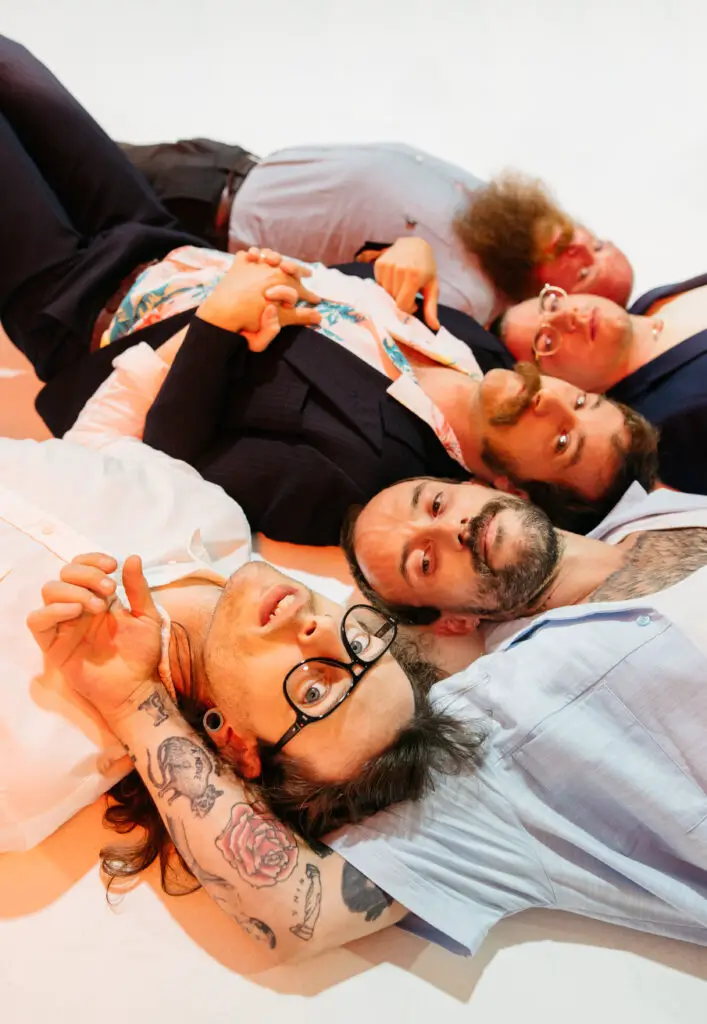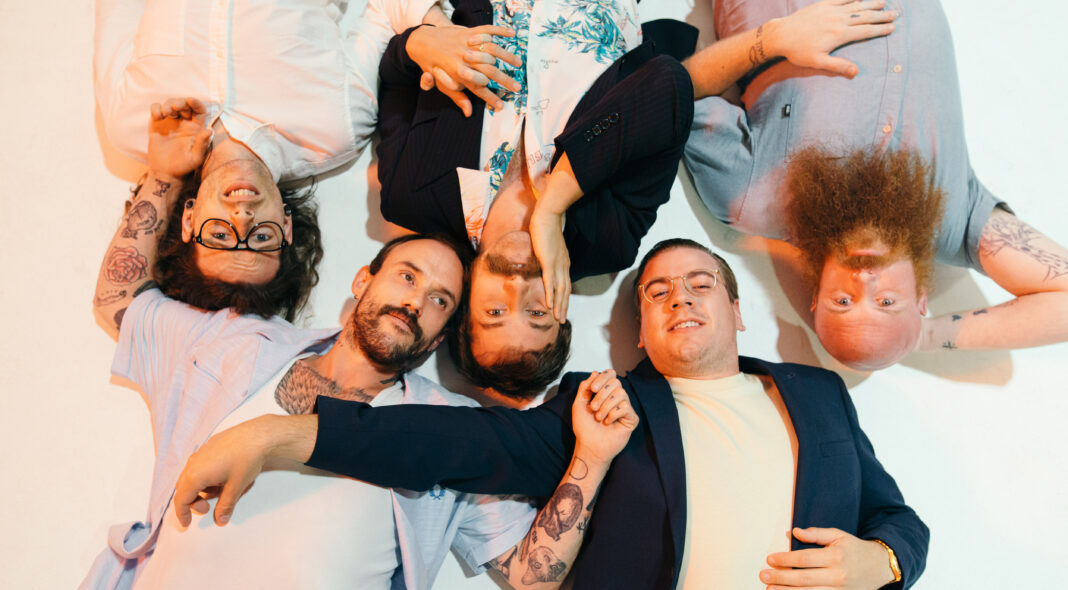Joe Talbot doesn’t care about what people think of him, except when he does. At the end of an elongated stretch of interviews for IDLES new record ‘Ultra Mono’, he is understandably worn a little thin, trying to resist the impulse to second-guess every answer he gives in case it can be spun into something else. He’s polite but noticeably suspicious, and the reassurance that we are not in the habit of malicious clickbait-mining does little to assuage his fears. “I’m trying to stitch myself up – that’s the problem.” Only somebody close to Talbot would be able to tell if he is joking.
Pre-existing agenda or not, there is no denying that IDLES ascent to visibility as one of Britain’s most talked-about rock bands is a feat that would not have been foreseen by many, least of all the band themselves. Having spent their early years working on pleasant-but-unremarkable indie, the sound they found on 2017’s ‘Brutalism’ was something of a fortune-reverser, tapping into a more primal aesthetic of snarking witticism and chunky riffs. ‘Joy As An Act Of Resistance’, their 2018 follow-up, was a certified crossover-moment, nominated for the Mercury Music Prize and positioning them as the socially-conscious prophets of a dedicated online following, the AF Gang. The exact moment of change is difficult to pinpoint, but Joe believes it is rooted in the strength of their live show, a formidable display of energy sorely missed during the current pandemic.

“I’m realising is that touring was our validation, our complete essence of being a band,” he says, twirling a pen as he sits in front of a colossal stack of Ultra Mono vinyl, ready and waiting for his signature. “We wrote our songs with the live performance in mind, and we built connections with people – AF Gang was built from meeting fans after shows. It’s just in front of you, that physical exponential growth, and it had switched to understanding – “you’ve made me believe in myself again, love myself, talk to my son or daughter or dad or mum”. That was what we wanted, and it all started happening with ‘Joy’. Now, this new album is about reconnecting with one’s self in the moment, which couldn’t have come at a better time. It’s a very serendipitous album, but people were feeling very isolated and disillusioned before COVID happened. Lest we not forget, Boris will still be there after.”
There’s a lot to unpick in this answer, but we’ll start with the serendipity. For anyone familiar with IDLES past material, ‘Ultra Mono’ offers a notable step away from the meticulous observation that made their name, preferring something more instinctive. A lifelong hip-hop fan, Joe has never been quiet about his affection Kanye West’s ‘Yeezus’, but having spent the past two years of his life being held up as something of a punk messiah, he was determined to start explaining himself less, embodying the stark self-awareness of rap. Out went the lyric book, and in came the mic; stepping up to record the words as they came to his consciousness.
“It was really scary, as it should be. I wanted to be as concise and momentary as possible – the best Kanye lyrics are the slightly absurdist ones where he sums up his whole existence in a single line – ‘Hurry up with my damn croissant’. That kind of bombastic, cutthroat confidence is what I’ve been leaning towards forever, but I also wanted to be seen as intelligent and funny and conscientious. I wanted to be loved. I was overextending myself – in interviews, in reading reviews of ‘Joy’, in interactions where I thought I’d upset someone – always coming away like, ‘What am I doing wrong?’ ‘Joy’ made me a lot more self-aware, but also a lot more under the microscope. So ‘Ultra Mono’ is about going right, I need to exercise existentialism by exorcising existentialism. You can’t control anyone else’s perspective of yourself. Artistically that meant for as many songs as possible, I hit a certain point and went ‘stop trying to write, just do it in the booth’.
‘Ultra Mono’ is about going right, I need to exercise existentialism by exorcising existentialism
joe talbot
It’s a difficult thing to pull off – the knowing braggadocio of hip-hop doesn’t always translate to a guitar-led space, where the vocalist is perceived as the mouthpiece of an entire band’s truth. Countering this meant changing the whole style of IDLES performance – less wall of sound, more tactical construction to allow a singular snare or sub to truly kick. Working with producers KennyBeats, [Vince Staples, JPEG Mafia, Denzel Curry] and Nick Launay [Arcade Fire, Nick Cave, Anna Calvi], the recording process became an exercise of creative bricolage, pulling together the influences of Joe’s musical life in a feat of classic IDLES unity.
“It’s important, for me as a human being, to celebrate what I love in music.” he agrees. “If I was say, a music journalist, or a food critic… if I ate a shit meal, I just wouldn’t write about it. I don’t want to waste my time pontificating on shit I don’t like.”

Certainly, there’s no shortage of IDLES pontificators who go to great lengths to espouse their grievances with the band. As with any act that dares sticks their head above the political parapet, the scrutiny that has befallen them is polarising – sometimes constructive, but often focused around a suspicion of performativity and virtue signalling given their relative privileges, many of which Joe readily acknowledges for himself. Raised in Exeter before moving to Bristol, recent single ‘Model Village’ has ruffled such feathers, criticised by some as an unhelpfully-divisive diatribe against small-town Britain, especially given Talbot’s usual message of unity.
“The thing is, there’s not a lot of people like you in Devon”, he says, presumably referring to my mixed-race. “Coming from there, I knew there was something sinister about the status quo. The non-fluidity of its culture and the lack of diversity, not just in people, but in everything. It wasn’t until I moved to Bristol that I realised how frustrating and dangerous those places are for a young person. The trouble is for me, change comes from empathy. And the only way empathy happens is through confidence, and confidence comes from education, re-education, and compassion. But the last thing I suggest is for you to move to Devon to help those people out. You’re the victim of the problem, not the cause. Exeter is improving, and with time… diversity means understanding, understanding means empathy and empathy means progress. But I just think, fuck that. If I became a dad in Devon, I’d move.”

On the subject of wider criticisms, he is similarly dismissive. “It comes down to the line in ‘Grounds’ really – if you want to spend your energy saying how much you hate IDLES music, fucking go for it. But people that attack IDLES because we’re middle class, is one, inaccurate, two, a completely benign way to perpetuate the problem of class culture and three, you don’t get to put my shoes on and tell the world what my intentions are. I don’t want food banks to be a necessity in this country; that’s not because I’m starving. We are allies, whether people say we are or not.”
I don’t want food banks to be a necessity in this country; that’s not because I’m starving. We are allies, whether people say we are or not.”
Joe Talbot
Nobody gets it right 100% of the time, but it is certainly true that IDLES do more than most bands when it comes to allyship. A quick scroll through the AF Gang Facebook page clearly demonstrates the cathartic rewards that can be reaped when conversations about toxic masculinity are destigmatised, and a recent re-print of their classic ‘No One Is An Island’ T-shirt has raised £30,000 for Black Lives Matter charities, a notable gesture in light of the misguided censorship of BLM posts within the AF Gang’s administrative team (swiftly resolved upon fan complaint). Anyone who listens to their music or attends one of their shows wouldn’t be hard-pressed to guess whether IDLES skew red or blue. That said, social media presence talks, and the decision to encourage fans to vote in the last election without suggesting a side didn’t go down well with those who expected a more incisive use of platform. It’s a criticism that Talbot is aware of, but he insists that his role is to encourage empowered choice, not to force opinions.

“The reason why I started IDLES was to save myself, not to “save Labour” he says, intoning the air quotes. “That’s what I wanted IDLES to be, a catharsis in change from self-abuse, to instil that sense of enlightenment in other people. ‘Joy As Act Of Resistance’ is the fable of the sun and the wind; you can blow and blow and blow, that man will not take his fucking coat off. But if you open your heart and mind and listen to those people’s stories, and give them a chance to explain themselves, that will give them the confidence to feel empathy, to create change, and to kill fascism. That’s my opinion.”
If ‘Ultra Mono’ doesn’t necessarily have all of these conversations on record, the supporting promotion of it proffers further space for nuance. Back in May, Talbot launched ‘Balley TV’, a six-part YouTube series that sees him chat with virtual guests propped up on something that resembles a variety of musical guests from a dystopian set that looks something like a cross between 90s Kids TV and late-night Channel 4. He’s not entirely happy with its presentation – “to do it well, it would have to be my only thing for a while” – but he’s satisfied with the way it has connected with fans, capturing their lockdown attentions. An ever-restless creative, he’s already got his sights set on other projects – not least delivering more of those now infamous IDLES T-shirts, designed entirely by the man himself.
“There’s probably double the amount of T-shirts than there are songs now, at least,” he laughs. “But on a serious note, all bands should focus on getting T-shirts as soon as they can. It’s half of our income – that’s where we’re all at now. Before I started the band, I was in in the mix of starting a clothing label. T-shirts in hip-hop culture are massive, and the crossovers between it all, I just love it. So yeah, I’m gonna go back to making T-shirts once this is done with.”
Fans needn’t fear the end just yet – album four is already underway, a self-described response to ‘Ultra Mono’ in the same way that ‘Ultra Mono’ responds to ‘Joy’. This time, he says, it’ll be more of a musical change than an existential one – “I don’t want to keep doing what I’m doing now, so I’m not going to.” Before all of that though, is the small matter of bringing ‘Ultra Mono’ full circle – taking it back to the stages upon which their craft was built. Whenever those shows might be, there is only one agenda in mind – to be as brutally honest and present as possible.
“The skill that I’ve learnt about performance is again what ‘Ultra Mono’ is all about – a momentary acceptance of the self. If I go into a show in a bad mood, you get me in a bad mood, but amplified. There’s a reason why mascara is thicker on a theatre stage; you’ve got to fill a room and make sure the people at the back know you’re in that bad mood just as clearly as people at the front. If you want to act unamplified, you’ve got to be a fucking good actor, which I’m not. But what I can do is let people know when I’m happy.”
And is Joe Talbot happy, truly? Critics will say as they will, but does ‘Ultra Mono’ achieve everything he wanted it to?
“I think this is apex IDLES. It’s the highest echelon of us learning our language as artists, and now we need to change to stay interesting. This is us completing the journey that we’ve spent three albums aiming for. I couldn’t be more myself on this album; Bowen and Lee and Dev and Jon couldn’t be more themselves. It’s about being accepting of yourself in the moment, and that is the journey of artists, to be the most them that they can be.” He pauses in a half-smile, not able to resist laying one last breadcrumb to test our click-baiting ways. “Whether that’s a liar or not, just be the best liar you can be.”
‘Ultra Mono’ is out on 25 September 2020.







